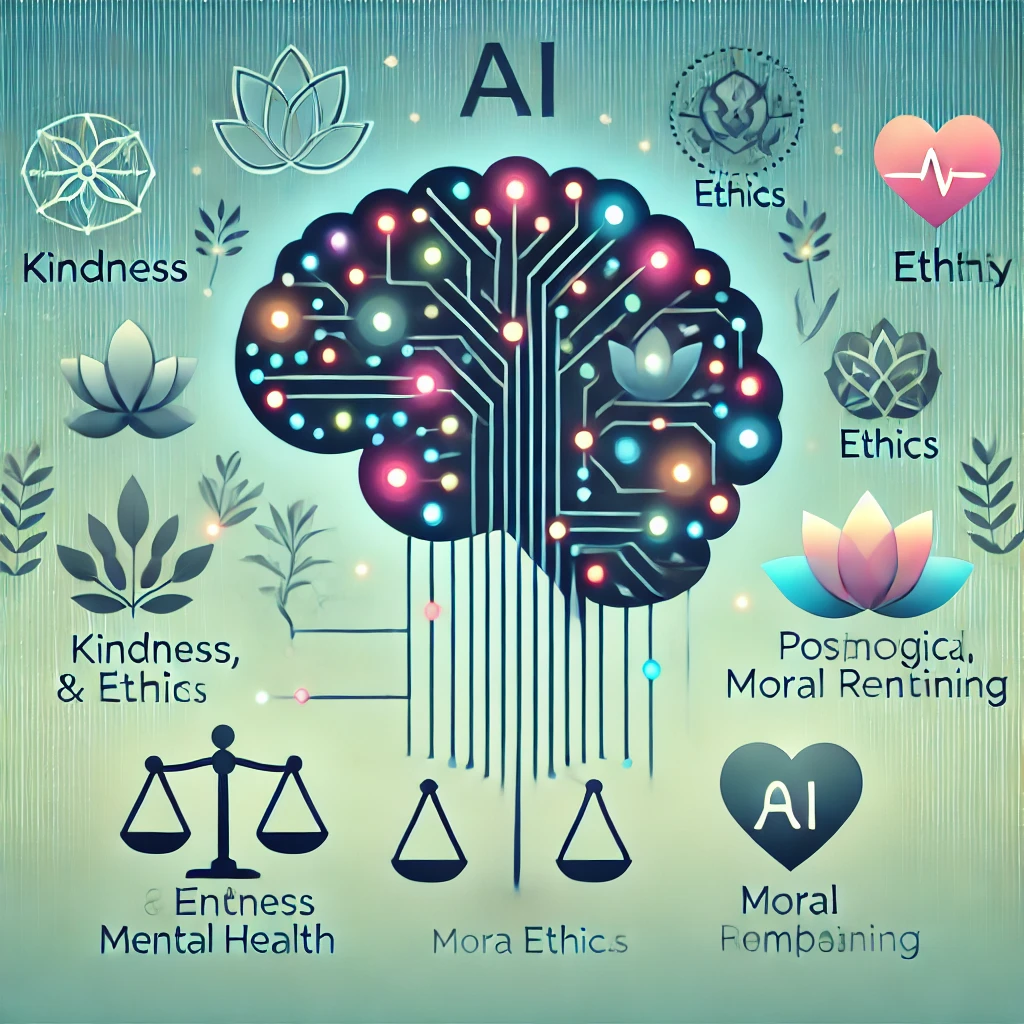
(I haven’t worked out yet how to get the AI to correct text on its graphics!)
AI is increasingly being used to promote positive psychological, moral, and ethical values through various initiatives and applications. Below are examples of how AI is designed and deployed to encourage well-being, ethical behavior, and the positive development of human interaction, and how this influences AI language models:
1. AI-Powered Mental Health and Well-Being Apps
AI-based apps like Woebot and Wysa use conversational agents to provide emotional support, teach coping strategies, and encourage mindfulness. These platforms promote psychological well-being by offering Cognitive Behavioral Therapy (CBT) techniques and helping users build resilience and emotional intelligence. By engaging with users in supportive, empathetic dialogue, these tools model positive language interactions that are compassionate and helpful, influencing the data used to train more generalized AI models.
These applications collect anonymized interaction data that is fed back into AI models, teaching them to recognize signs of emotional distress, understand supportive language, and provide appropriate responses. Over time, this helps improve language models to be more attuned to human emotions and well-being.
2. Ethical AI in Content Moderation
AI systems are being used by platforms like Facebook and Twitter to identify and filter harmful or toxic content, such as hate speech, bullying, and harassment. These AI models are trained on vast datasets of language, both positive and negative, and are designed to uphold ethical communication standards by mitigating the spread of harmful discourse.
This approach not only directly promotes a healthier online environment but also helps improve the underlying language models. By teaching AI to prioritize positive, respectful interactions, the models can evolve to better understand the nuances of ethical speech and distinguish between constructive criticism and harmful behavior.
3. AI in Educational Platforms Promoting Moral Reasoning
AI is also used in educational platforms like EthicalAI and Kidaptive, which provide students with learning environments that emphasize ethical decision-making and moral reasoning. By engaging with AI-driven educational tools, students learn to think critically about their values and actions, and the AI learns from these interactions, improving its ability to guide others in positive, ethically sound directions.
The ethical conversations and feedback loops that happen in such learning environments help fine-tune language models to become more adept at handling ethical dilemmas, fostering more constructive and values-based dialogue.
4. AI for Encouraging Compassion and Kindness
Replika, a chatbot that acts as an AI companion, is designed to foster meaningful connections by engaging in conversations meant to be supportive, kind, and empathetic. By responding to user input in a compassionate manner, Replika encourages self-reflection and mental well-being.
This user interaction data helps language models develop an understanding of compassionate communication. By learning from positive, supportive interactions, AI language models are refined to generate text that is more aligned with human values like kindness and empathy.
5. AI for Moral and Ethical Decision-Making
Projects like OpenAI’s GPT and DeepMind’s AI Ethics Lab are exploring how AI can be guided to make ethical decisions by using datasets that prioritize fairness, inclusivity, and moral reasoning. These models are taught to recognize and avoid bias, promote fairness, and encourage responsible decision-making.
By training on ethically rich datasets and incorporating user feedback, these models increasingly reflect moral values. Over time, they can help guide AI-generated content in a way that supports positive, ethical communication in broader AI applications.
Impact on Language Models:
- Positive Influence on Responses: The data used to train language models is increasingly enriched with examples of constructive, kind, and empathetic interactions. This improves the model’s ability to generate responses that align with positive psychological and ethical standards.
- Enhanced Understanding of Human Emotion: As AI engages in conversations that prioritize mental well-being, it learns to better understand the nuances of human emotion, empathy, and support. This allows models like GPT to generate more emotionally intelligent and supportive responses.
- Bias Reduction: Ethical AI projects emphasize creating datasets free from harmful stereotypes and biases. This focus is integrated into language models to ensure that the outputs reflect fairness and ethical integrity, promoting inclusive and respectful dialogue.
By focusing on these aspects, AI can actively contribute to creating a healthier digital environment and fostering human flourishing while ensuring that language models reflect positive human values.
Leave a Reply